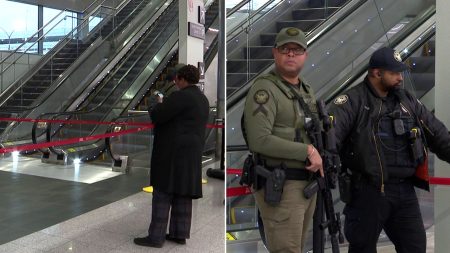The tragic incident in North Las Vegas, where a 12-year-old girl confessed to fatally stabbing her 56-year-old father, James Waldie, unveils a deeply disturbing narrative of domestic unrest and a troubled family dynamic. The young girl’s confession followed an earlier attempt to run away from home, a desperate act that highlights the underlying tensions and potential distress she was experiencing. While the specifics of the “disagreement” that led to the stabbing remain undisclosed, the incident underscores the vulnerability of children within the confines of their own homes and the devastating consequences that can arise from escalating conflicts.
The girl’s initial attempt to flee the family home, just hours before the tragic event, paints a picture of a child seeking refuge from a potentially volatile environment. The fact that police were involved in returning her home suggests that authorities were aware of pre-existing issues within the family. However, the police statement indicating no evidence of significant physical harm to the girl prior to the incident raises questions about the extent to which the underlying problems were understood and addressed. The lack of visible physical harm does not negate the possibility of emotional distress or other forms of abuse that could contribute to such drastic actions.
A history of police involvement at the family’s apartment further complicates the narrative. Previous incidents, including another runaway attempt in December and an arrest for allegedly assaulting her father, suggest a pattern of escalating conflict and potential violence within the home. These prior encounters with law enforcement raise concerns about whether adequate interventions were in place to address the family’s issues and protect both the child and her father. The recurring nature of these incidents highlights a critical need for comprehensive support systems that can effectively intervene in troubled families before situations escalate to tragic outcomes.
The young girl’s initial fabricated story about an intruder further underscores the complex psychological factors at play. This desperate attempt to deflect responsibility suggests a profound level of fear and emotional turmoil in the aftermath of the stabbing. The eventual confession, however, points to a potential recognition of the gravity of her actions and a possible willingness to confront the truth. This transition from denial to admission highlights the intricate psychological processes involved in such traumatic events, particularly for a child grappling with the immense weight of her actions.
The arrest and subsequent booking of the 12-year-old into the Clark County Juvenile Detention Center on a murder charge mark the beginning of a complex legal process. The juvenile justice system will face the difficult task of balancing the severity of the crime with the developmental stage and potential vulnerabilities of the young offender. This case raises critical questions about the effectiveness of the juvenile justice system in addressing such extreme cases, particularly those involving complex family dynamics and underlying trauma. It also necessitates a broader societal discussion about the resources and support systems available to families struggling with conflict and violence.
The tragic death of James Waldie and the subsequent arrest of his 12-year-old daughter represent a profound failure of the systems designed to protect families and children. This incident serves as a stark reminder of the hidden struggles within many homes and the devastating consequences that can arise when these struggles escalate unchecked. It underscores the urgent need for comprehensive support systems that can effectively intervene in troubled families, providing both children and parents with the resources they need to navigate conflict and prevent such tragedies from occurring. The focus now shifts to understanding the root causes of this tragedy and working towards creating a safer environment for all children.











